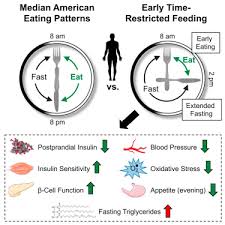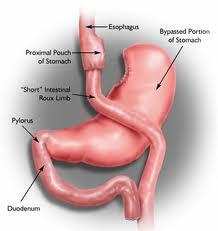Intermittent fasting (IF) is a popular dietary strategy these days amongst people who are looking to shed pounds. While IF has not been shown to be any better than daily calorie restriction for weight loss, many have speculated that IF may improve cardiometabolic health, with conflicting data as to whether this is actually the case.
A new study suggests that IF at the right time of day may actually improve metabolic health.
The study was small but elegant – 8 men with pre diabetes, who were assigned to intermittently fast using a new technique called ‘time restricted feeding’ by eating during only 6 hours per day (with dinner before 3pm), or to eat over a more typical 12 hour period each day. They followed this eating pattern for 5 weeks, and later crossed over to the opposite eating assignment for another 5 weeks.
All meals were supervised, and were geared towards keeping body weight the same (i.e. this was not a weight loss study).
They found that eating only 6 hours per day resulted in improved insulin sensitivity, blood pressure, appetite, and markers of oxidative stress.
How does this work? Well, there is a hypothesis that after 12 hours or more without food, our bodies flip a ‘metabolic switch’ of sorts, turning to fat as a fuel source once liver glycogen (sugar) stores have run out (there is an interesting review from the journal Obesity on this).
Interestingly, the time of day when food is eaten seems to be important – while this study showed a metabolic benefit to restricting food intake to 6 hours earlier in the day, other studies restricting food intake to the late afternoon or evening have shown either no benefit or worsening of metabolic parameters (these studies are referenced in the article). This may be because eating earlier in the day fits better with our circadian rhythm of hormones, as our insulin sensitivity, and also the calories we burn while digesting food are higher in the morning.
We often recommend: “Eat breakfast like a king, lunch like a prince, and dinner like a pauper.” While this principle was founded on the idea of avoiding overeating in the evening due to not eating enough during the day, it seems that there may be a physiologic basis for eating earlier in the day to promote metabolic health.
Perhaps our new slogan should be: Eat breakfast like a king, lunch like a prince… and have your dinner early.
Stay tuned to www.drsue.ca for discussion of a brand new study on intermittent fasting in people with type 2 diabetes, coming soon!












